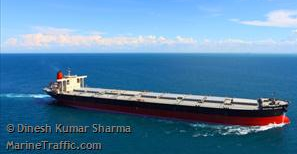(BGF) – This article, featured on Bloomberg‘s website discusses a recent Chinese court order to impound a Japanese ship, the Baosteel Emotion, as compensation for two Chinese ships leased by Japan in 1937 that were ultimately lost at sea. As the article discusses, this Chinese court order reflects the recent increase in tensions between Japan and China over the Senkaku/Diaoyo Islands and Prime Minister Shinzo Abe’s visit to the Yasukuni Shrine. Consequently, this court order could have negative impacts on Chinese-Japanese economic ties by discouraging business between the two countries. Click here to read the full article or visit Bloomberg‘s website.
China Court Impounds Japanese Ship in Unprecedented Seizure
By Bloomberg News
A Shanghai court ordered the seizure of a Japanese ship owned by Mitsui OSK Lines Ltd. (9104) as compensation for the loss of two ships leased from a Chinese company before the two countries went to war in 1937.
The 226,434-ton Baosteel Emotion was impounded on April 19 at Majishan port in Zhejiang province as part of a legal dispute that began in 1964, the Shanghai Maritime Court and Mitsui OSK said in notices on their websites.
The holding of the ship reflects strained ties between China and Japan amid a territorial dispute over an island chain and visits by Japanese politicians to a Tokyo shrine honoring that country’s war dead. The move is the first time a Chinese court has ordered the seizure of Japanese assets connected to World War II, and could cast a pall over the countries’ trade, according to Shogo Suzuki, a senior lecturer at the University of Manchester in the U.K. who studies China-Japan relations.
“Many of the major Japanese companies like Mitsubishi or Mitsui have existed through back to the pre-war era and could all be implicated in one way or another,” Suzuki said. “Japanese companies can’t extract themselves easily at this stage so I think they’ll be quite worried.”
Disputes have increasingly shifted to the courts, with a Chinese judge accepting a lawsuit last month against two Japanese companies, including Mitsubishi Materials Corp. accused of using forced labor during the war.
Discourage Business
Speaking at a briefing today, Japan’s Chief Cabinet Secretary Yoshihide Suga said the seizure could discourage Japanese companies doing business in China. Mitsui OSK spokesman Atsushi Seki said the company is studying details of the case and trying to come up with a solution.
The dispute had its genesis in 1936, when Mitsui OSK predecessor Daido Kaiun chartered two vessels from Chung Wei Steamship Co., only to have them appropriated by the Japanese government, Mitsui OSK said in a statement today. Both ships were later lost at sea.
The heir of Chung Wei Steamship’s president sued unsuccessfully in Japan in 1964 and 1970, and then took the case to China in the late 1980s. After the maritime court ruled in the plantiff’s favor, Mitsui was seeking an out-of-court settlement when the vessel was “suddenly impounded,” Mitsui OSK said.
Japan argues that China gave up its right to reparations as part of a 1972 joint communique signed when the two countries established diplomatic relations. The communique says China “declares that in the interest of the friendship between the Chinese and the Japanese peoples, it renounces its demand for war reparation from Japan.”
Click here to read the full article.
